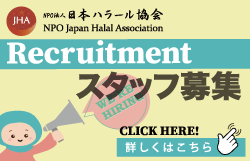NPO Japan Halal Association is a halal certification body approved by JAKIM (Malaysia), MUIS (Singapore), BPJPH (Indonesia), HAK (Turkey), GAC (Gulf countries) and MOIAT(UAE).
Participation in Global Halal Summit 2023, JAKIM Convention, MIHAS opening ceremony
[Activity report] Participation in Global Halal Summit 2023 , JAKIM Convention , MIHAS opening ceremony
2023/9/9-12 implementation
Venue: Kuala Lumpur Malaysia
Global Halal Summit 2023 was held in Malaysia from September 9th to 12th, 2023. Global Halal Summit 2023 is an annual event led by the Malaysian government’s Ministry of International Trade and Industry to strengthen the position of the halal industry, which is a national policy, both domestically and internationally. This year as well, the Ministry of Religious Affairs JAKIM convened halal certification organizations and related organizations from around the world, and JHA ‘s chairman and vice-chairman participated in various events such as the JAKIM Convention and the MIHAS opening ceremony.
The JAKIM Convention is set up as an opportunity to present issues such as halal certification, issues in the halal industry, and new guidelines.In addition, there will also be opportunities to listen to speeches from the prime minister and related ministries at the opening ceremony of MIHAS, an international halal exhibition held concurrently . , I visited exhibitions in each country. Until last year, these events had only been held online due to the coronavirus pandemic, and it was the first time in four years that they had been held in person. The event was held in an atmosphere that felt like attending a class reunion, as participants talked about nostalgic memories with members of certification bodies and related organizations from various countries.
Featured event JAKIM Convention Biggest change ever
Among them, the one that attracted the most attention was the JAKIM Convention . This time, only certification bodies and accreditation/approval organizations participated, and there was no general participation, so the theme was narrowed down to the content that we were interested in, resulting in a rich conference.
At the beginning, Mr. Datuk Hajah Hakimah Binti Mohd Yusoff , representative of JAKIM , Ministry of Religious Affairs Malaysia , gave a representative address, followed by Mr. Mr. Mrzuki Bin Hasan, representative of JAKIM Halal Division . He spoke about the important tenets of Islam and its contribution to the benefit of society as a whole. Both of them are worthy of leading JAKIM and have shown us what a certification organization should be like.
After that, on the first and second days of the Convention , speeches were given by “certification and approval bodies” that are involved in certification standards and halal regulations in each country.
Participating as “certification/approval bodies” were Standard Malaysia , which creates standards for Malaysia including JAKIM , Indonesia’s BPJPH , GAC from the Gulf countries , SFDA from Saudi Arabia , HAK from Turkey , and SMIIC , which creates standards for OIC countries.
Among the highlights, Mr. Shaharul Sadri from Standard Malaysia Department announced in his speech that the above-mentioned accreditation and approval bodies from each country have established an organization called IFHAB ( International Forum Halal Accreditation Body ) to integrate accreditation and approval from each country. It was announced that it had been done. This means that by using the certification standards ISO/IEC17065 and SMIIC 2, each country will be able to mutually recognize certifications from any country. If this becomes a reality, it is a great hope that certification bodies like our association will be able to break free from the situation where they are burdened with work all year round to obtain certification and approval from each country, incurring enormous costs. This was an excellent suggestion. They also said that they plan to implement this within the next two to three years. I have high hopes for this.
Also, if these are realized, it will mean that countries such as Malaysia and Indonesia will adopt the SMIIC standards , which have been stubbornly rejected, and that SMIIC1 will become the world’s standard for halal certification. means. Just to be sure, I checked with the speaker, Mr. Sadri , and when asked whether, for example, when exporting to Malaysia, whether to use Malaysian standards ( MS1500:2019 ) or SMIIC 1, he replied, ” For the time being, we will accept either option.” This probably means that eventually they will stop using the Malaysian standards and only use the SMIIC standards.
I’ll say what I want to say
Following speeches from “certification and approval bodies” on the first and second days, from the second half of the second day of the convention , speakers passed the baton to “certification organizations around the world.” Representatives of certification bodies from the United States, Japan, South Korea, Australia, and India, all non-Islamic countries where Muslims are minorities, made the announcement.
Lemmon from our association took the stage and gave a speech entitled “Challenges of Halal Certification in Japan.” I would have liked to say that this applies to Halal certification in all countries around the world, rather than in Japan, but I am only speaking based on our association’s empirical rules.
Although the topic was the same as the previous talk about certification bodies, I focused my talk on three points from the perspective of a certification body.
- Certification organizations like ours spend time, effort, and money all year round to obtain (and maintain) certification and approval in each country. While there are benefits to receiving certification and approval, it can also leave you exhausted and unable to perform the essential halal certification audit work. If other countries are required to obtain the same certification, small certification organizations will no longer be able to continue. It is very welcome news that the last certification and approval bodies will be unified worldwide, and I hope that this will be implemented as soon as possible.
- Halal certification can also be influenced by the world situation, and something like a global judging committee should be established as soon as possible. Recently, as part of the SDGs, there have been a number of moves by the industry to protect the earth, such as biomass naphtha made by reusing waste oil and recycled PET. There are various issues that need to be addressed in order to make these issues compatible with Halal-certified products, but the topic is too grand for a certification organization like ours to decide on. Since this is the only way for Islamic scholars and scientists around the world to deliberate and decide based on their knowledge, I would like to request that a forum be established where such discussions can take place.
- It is customary for each country’s food import regulations to be notified to GtoG. For example, in Japan, regulations regarding food additives and livestock farming are notified to the Ministry of Health, Labor and Welfare and the Ministry of Agriculture, Forestry and Fisheries, and then to each industry. However, in the case of Halal certification, the government agencies of each country directly notify private certification organizations like us. We are directly informing the business operators of this fact. When you think about the “responsibility of receiving and disseminating information,” private citizens like us have a very heavy burden. If the information received is insufficient, misunderstood, mistranslated, or causes damage to the business, we will be responsible for conveying the information to the business.
For example, at the beginning of this year, the Turkish Embassy in Japan notified our association that the Turkish government had amended new laws and there were regulations regarding Halal certification. As a result, the certification body and the products to be exported cannot be exported unless they are registered with the Turkish government. In response, we immediately notified the certified companies and worked quickly to ensure that exports could be completed without delay.
Under normal circumstances, each country’s embassy would notify the Ministry of Foreign Affairs of Japan, which would then allocate it to each ministry and agency, and then the private sector would act to comply. The same applies not only to Turkey but also to Malaysia, the Gulf, and Singapore. Indonesia is the only country that is currently trying to implement a GtoG response, but Japan has not done so because it does not have any ministries or agencies that correspond to the other country’s religious ministries. Halal certification is now considered more of an import regulation than a religion, and should be dealt with comprehensively by appropriate organizations such as the Ministry of Agriculture, Forestry and Fisheries and the Ministry of Health, Labor and Welfare, but so far this has not happened. The situation is such that private certification bodies have no choice but to take on this role.
Since the title of the presentation by each country’s organizations on the second day was exactly ” Trade Barrier , “ it can be said that the current Halal-related import regulations are correct in that interpretation.
In this way, the government of each country should have dealt with the government of Japan, but since the responsibility of being approached directly by the private sector is unbearable, each country has appealed the need to approach the government rather than the private sector. Ta.
Our speech was supported by certification bodies around the world who have long held the same sentiments. He was also ridiculed, saying, “You opened Pandora’s box,” and in the meeting that followed, the members of the certification body, who could no longer hold back their feelings, led to a discussion in which they blamed the certification body. However, as a result, I think it was a meaningful opportunity to learn that the demands of unilateral certification bodies in each country do not necessarily match the current situation.
in conclusion
What we, as Japanese halal certification organizations, should take this opportunity to think about is how to maintain a sustainable organization in Japan in the future. Assuming that accrediting bodies in each country will certify only one organization per country in the future, we believe that the above-mentioned consolidation of accreditation bodies, unification of certification standards, and integration of domestic certification bodies will be an inevitable trend. What we need to do in the future is to integrate domestic organizations. Although I may not be able to do it right away, since this is the direction I am aiming for, I will do everything I can to ensure that I can achieve it.
Chairman Fumiyuki Lemon





